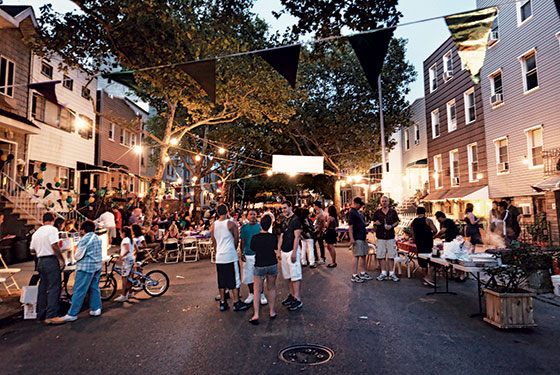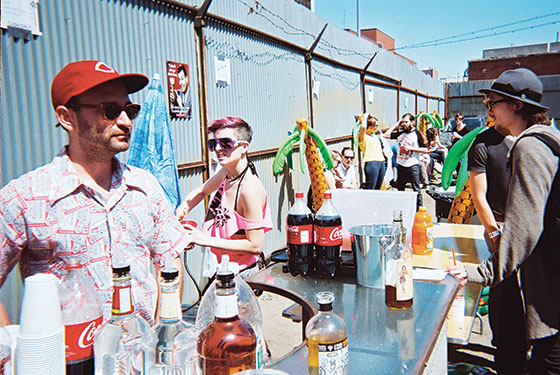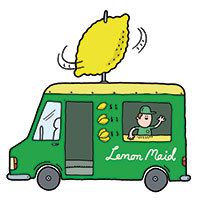
Though anecdotal evidence may suggest otherwise, the funnel-cake and five-buck-pashmina hawkers at those ubiquitous weekend street fairs aren’t the only people allowed to shut down city thoroughfares. Last year, the Mayor’s Street Activity Permit Office licensed 2,274 block parties, while the Department of Parks and Recreation handed out more than 16,000 permits for special events in public parks. The catch? You have to jump through a few bureaucratic hoops—including an avalanche of paperwork. Here, a step-by-step playbook to navigating the whole process.
Scouting the Location
How to secure a prime street, park, or private outdoor space for your shindig.
Party on Your Block:
The most important thing to remember when applying for a block-party permit: You have to submit your application at least 90 days in advance of the event. Filing a request isn’t pricey; you’ll pay just a $25.75 processing fee, plus the cost of any additional permits called for by your specific party plans.
The application process: While it varies by community board, you’ll always start it by filling out a form, providing information about yourself, the event date and time (a permit can close a street for up to nine hours, although you can’t party later than 9 or 10 p.m., depending on your neighborhood’s rules), and the block you wish to commandeer (it must be in your actual neighborhood of residence). The application includes 35 questions on everything from whether there will be tents erected to if you’ll have celebrity appearances. After you submit your application, the Street Activity Permit Office reviews it with your community board and “comments on the worthiness of closing that block,” says SAPO director Emil Lissauer. Most community boards will also require you to get the consent of a certain percentage of residents via petition.
Seeking approval: “If you’re looking for ways to improve your chances, reaching out to the community board first and getting support there is a smart way to do it,” says Lissauer. Permits for parties on blocks located at busy intersections generally won’t be approved, in which case the community board may suggest an alternative nearby. Timing conflicts are another common issue, so be prepared to negotiate a backup date.
Post-acceptance: The NYPD, the FDNY, and other city agencies will each review your application to check for potential permitting issues. You can bring up party add-ons later in the process, too—if, for example, you decide you just have to have a mechanical bull one month out—and Lissauer says the city will work with you to revise the application accordingly.
Trash: “The applicant is responsible for leaving [the block] the same way they found it,” says Lissauer. While you’re welcome to do your own pre- and post-party clean sweeps, you can alternatively hire the Department of Sanitation for about $40 per hour to bring in a mechanical broom, about $30 per hour for a collection truck, $66 to $88 per hour for a supervisor’s fee, and $48 to $65 per hour for a sanitation worker’s fee (prices depend on the day of the week).
Things you don’t have to worry about: “You won’t have to provide any sort of security for the event,” says Lissauer. “That doesn’t mean the Police Department wouldn’t have someone there, but that’s their decision,” he says. Should your local precinct decide to post officers at your party, you won’t be charged for it. Another thing you don’t have to stress about: whittling down your guest list. “If you told us there were going to be 10,000 people at your block party, we’d consult with the NYPD,” says Lissauer, “but we’ve never had an issue with attendance.”
Take It to a City Park:
Getting together with a group friends in the park isn’t so much a special event as it is a standard Sunday afternoon. But ensuring that the specific spot you’re eyeing will be available if you want to gather twenty-plus people and provide block-party accoutrements requires a little more advanced planning (at least 21 days, to be exact, although some areas require 30 days’ processing time) and a small investment ($25 to cover the application fee).
The application process: As with block parties, you’ll fill out an application with your information, the time and date you’d like your event to take place (when parties can occur varies based on the space you’re requesting), and the specific area you want to reserve; there’s also a basic twelve-item questionnaire that prompts you to explain whether you plan to have food for sale, set up any equipment in the park, or provide on-site medical service (don’t let this scare you away—answering no doesn’t equal instant rejection). Just as with block closures, various city agencies will review your application and reach out to you about any additional permits necessary for things like bounce houses or amplified sound.

Grilling: Cooking on a charcoal grill is allowed only in designated areas within certain parks—but in those spots, you’re welcome to BYO grill. The 2,771-acre Pelham Bay Park has three designated cookout spots, two of which are located seaside along Orchard Beach. In the scenic East River Park,the grilling area is outfitted with asphalt—all the better for staging a faux block party. (Note that a special-events permit is required here.) If you can nab one of the four grills located on the west end of Prospect Park, you’ll have easy access to picnic tables. And for those who are looking to ogle the Unisphere while flipping burgers, there’s Flushing Meadows–Corona Park. For more, visit nycgovparks.org.
The Plaza of parks: Although it doesn’t require the typical application process, the High Line (skylightnyc.com) is technically a public park, too, available for you to rent out—assuming you have $25,000 to spare. Here, though, you can bring in pretty much any type of vendor or service you want, so long as it fits in the elevator.
What it costs to break the rules: If your group is just over twenty people and isn’t causing a disturbance, it’s unlikely that any tickets would be issued. But if you do get caught sans permit, the fine is $50. Other fees for skirting the law include $140 for excessive noise or amplified music, $250 for an unapproved structure such as a tent or a gazebo, $250 for failure to comply, $50 for grilling, and $25 for every person caught drinking alcohol.
Spring for a Private Venue:
If all these logistics make your head spin, book a spot via Eventup.com, a free, Airbnb-esque site that lets you sift through restaurants, bars, and even private residences available for events. The Paper Box, for instance, is a Bushwick warehouse with a massive backyard; booking fees start at $150 per hour. And yes, alcohol is permitted.
Pro Tips
Have Enough Seating:
“Make sure people have good spaces for socializing. We like to have some permanent seating like picnic tables but also a bunch of folding chairs around so people can set up where they want.” —Justin Carter, co-founder of Mr. Sunday
Pick a Gimmick:
“Even something as simple as handing out glow sticks or sunglasses with your party’s name stickered across the front of the lens gets people excited.” —Troy Gordon, nightclub promoter for Lavo, Pink Elephant, and Avenue
Just Play the Hits:
“You ever try to kick it to a beautiful female while minimal techno is playing on a hot summer day? Right, me neither—because it’s impossible. Leave the dark tech records for Bar Paradiso in Berlin. Bring your Michael Jackson, Prince, and Stevie Wonder records, and watch your dance floor twerk.” —D.J. Jesse Marco, GQ’s Endless Summer at Ruschmeyer’s, Summer Party on the High Line

The Bottom Line About Alcohol
Open-container laws forbid alcohol at a city-sanctioned block party. That leaves two choices: (1) Find a backyard at a private venue where you can serve booze, or (2) hire a refreshments team like Del’s Frozen-Lemonade Truck (from $500; facebook.com/delsnyc). It’s on your guests if they opt to spike their slushies.
Feeding the Masses
It’s not a block party without some grub.

Planning to Hire Food Trucks? Know This …
Most vendors require around sixteen-by-six-feet of ground space, plus a minimum eleven-foot clearance. Unless you live in a back alley, most blocks can accommodate a food truck; parks, less so. Nearby outlets are a bonus but not a requirement; food trucks can typically provide a generator at no additional charge. As for permits, worry not: A legit truck owner will have the proper Department of Health licenses. And in terms of baseline costs, some trucks don’t charge anything if you can ensure a hungry crowd, while others start around $1,500.
Consider These Meals on Wheels
Miami Food Machine (miamifoodmachinenyc.com), the reincarnation of the now-defunct Bongo Brothers Cuban Food Truck, can be yours for the afternoon, along with Mamu Thai Noodle (facebook.com/MamuThaiNoodle), a Kickstarter-funded Thai street-food cart.
Here, Piggy Piggy
If you can’t picture a block party without a pig roast, forget about hosting it in a Manhattan park. Select outer-borough parks, as well as most streets, are more amenable. Just remember: The ultimate feast demands about eight hours of roasting, picking, and dressing. For all of the perks and none of the legwork, Nick Westervelt, co-owner of Clawhammer Farm, in Lisle, will deliver one of his heritage porkers to your party, then oversee all the niggling details ($20 per person for 30 to 50 guests, $15 per person for 50 to 100 guests, and $10 per person for 100 to 200 guests; $5 extra per person for two sides; clawhammerfarm.com).

Taking Care of Business
Park events require party throwers to rent one toilet for every 150 guests. Local loo renter Mr. John (from $100 per toilet; mrjohn.com) is more conservative, recommending one potty for every 50 people. Getting a permit is an issue only if your commode uses a fire hydrant as a water source—and those are prohibitively expensive anyway.
Castles, Bulls, Mini-Golf
Three infinitely Instagrammable diversions.

The Bouncy Castle
Scope out the nearest power source, then designate a space that’s at least sixteen-by-sixteen feet. The smallest bouncy castle at New York Inflatables, the preeminent renter of bouncy blowups, is thirteen-by-thirteen feet ($300; newyorkinflatables.com). Owner Winfield Prass recommends at least three feet of clearance space on every side. When booking a moon bounce, make sure the company is licensed and insured; the city Department of Consumer Affairs requires that vendors secure a Temporary Amusement-Device License for these types of rides, but it should come at no cost to you.
The Mechanical Bull
Set aside a twenty-by-twenty-foot area if you’re keen to bring in a bucking bronco (generally not safe for kids, of course). Up to three-hour rentals from WOW Entertainment (wowincevents.com) are $1,200, plus $300 for delivery.
The Miniature-Golf Course
Also available from WOW: temporary golf courses, complete with moving windmills and model trains (note: Some obstacles require power). A three-hole course needs at least 600 square feet (from $1,200 plus delivery); a five-hole course, at least 1,250 square feet (from $1,875); and a nine-hole course, at least 2,000 square feet (from $2,700). A registration tent, where employees hand out putters, score cards, pencils, and brightly colored balls, is included in the cost.

Bring in the Noise
Daft Punk or Nigerian funk: Whatever your music of choice, if you want any amplified noise at your block party—even if it’s just an iPod hooked up to a stereo—you should secure a $45 sound-device permit via the NYPD by calling 646-610-5560. Invest in the right equipment, too. “Mini-speakers won’t be loud enough,” says Gary Hoffman, owner of Brooklyn’s 74 Events (74events.com), which hires out D.J.’s for block-party gigs. Rather, bank on two 500-watt speakers per 100 revelers. Noise violations are of little concern—you can only get one if the volume exceeds 85 decibels over ten feet or if you’re blasting music after 10 p.m. (And block parties aren’t supposed to go that late.)
Mad Props
A sampling of gear you can borrow through Party Rental Ltd. (partyrentalltd.com)*
Charcoal grill: $110
Folding chair: from $3.05
Table: from $11
A four-by-four stage: $58**
Dance floor: $41.50/section
Cotton-candy machine: $105
Popcorn machine: $149
Velvet rope/stanchions: $38.50/set
* Prices are for three days; delivery is extra; minimum order is $300.
** Stages taller than two feet and larger than 120 square feet require a structure permit (call the Department of Buildings at 212-566-5000 to arrange).
If You’d Rather Attend Than Host
Free, open-to-the-public block parties.
New Museum Block Party (July 20, noon to 5 p.m.; Chrystie and Stanton Sts.; newmuseum.org): The museum’s annual fest features dance and music performances as well as interactive art projects.
Bushwick Block Party (July 27, noon to 11 p.m.; 261 Moore St., at Bogart St., Bushwick; bushwickblockparty.com): The Roberta’s team presents a Tiki Disco dance party, plus bands.
SculptureCenter Block Party (August 3, noon to 5 p.m.; 44-19 Purves St., nr. Jackson Ave., Long Island City; sculpture-center.org): Live music and artist-led activities define this fête, and this year, the LIC institution is joined by borough-mates the Museum of the Moving Image and the Noguchi.